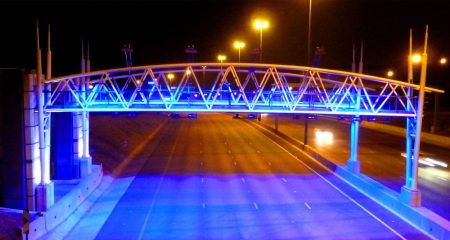 Roads agency Sanral has baulked at commenting on allegations that Electronic Toll Collection (ETC), which manages the collection of e-tolls in South Africa, agreed to pay R40-million to an allegedly dodgy subcontractor two weeks before ETC won the Gauteng Freeway Improvement Project (GFIP) e-tolls contract.
Roads agency Sanral has baulked at commenting on allegations that Electronic Toll Collection (ETC), which manages the collection of e-tolls in South Africa, agreed to pay R40-million to an allegedly dodgy subcontractor two weeks before ETC won the Gauteng Freeway Improvement Project (GFIP) e-tolls contract.
Sanral GM for communications Vusi Mona this week declined to respond to a list of questions e-mailed to Sanral on 3 March related to these allegations and to a request last week for additional comment after the Organisation Undoing Tax Abuse (Outa) publicly released further information about the alleged dodgy payments.
Moneyweb published an article on 4 March about the initial allegations made by Outa. The article did not contain any comment from Sanral because the roads agency indicated that it was unable to meet the deadline to provide comment.
Sanral changed tack this week, with Mona stating: “Sanral is unfortunately not able to respond to your questions until transport minister Fikile Mbalula makes a public pronouncement on the e-toll matter. As an implementing agent of government, Sanral continues to be guided by the minister and cabinet’s pronouncement on this matter.”
This is a reference to an undertaking given by Mbalula earlier this month that an announcement on the future of e-tolls will be made before the end of March 2021.
Outa said last week it has received a copy of the 2009 contract between ETC, which is owned by Austrian-based Kapsch TrafficCom, and South African sub-contractor Proash. It said the contract confirms the problems Outa recently raised about the ETC-Proash payments and even more concerns. Outa said a whistleblower sent it the contract after Outa recently exposed the existence of the unknown contract and raised questions about its purpose.
‘Backhander or enrichment scheme’
“The flaws in the contract suggest it was written as a way of paying a backhander, or as an enrichment scheme, linked to Sanral’s award to ETC of the main e-tolls collection and management contract for the Gauteng Open Road Tolling (GORT) project (GFIP).
“The contract shows that ETC hired Proash — a small business with no track record — to manage B-BBEE (broad-based black economic empowerment) issues for R40-million, payable over nine-and-a-half years, signing the flimsy service-level agreement about 10 days before ETC signed with Sanral.
“Outa previously confirmed that at least R10-million was paid over the first three years of the contract but no work appears to have been done,” it said. Outa said concerns arising from the contract include company details, VAT records and the legitimacy of the services supposedly delivered. It said it has provided ETC with a copy of this contract and its concerns to encourage an investigation into this matter.
 Outa director for accountability Stefanie Fick said in the organisation’s letter to ETC: “It is Outa’s understanding that payments made to Proash were claimed back from Sanral and did not form part of the GORT project payment they received. ETC should be mindful that any funds that were spent on payments to ETC were taxpayers’ money, and therefore it is critical to establish if the agreement and payments to Proash were legitimate. We once again give you our undertaking to cooperate with any independent investigations on this matter. We once again request that you make your findings public and also share your findings with Outa. If you are serious about the fight against corruption in this country, we need your undertaking to act on any wrongdoing that emerges out of this matter and that you will be transparent with the findings and your report.”
Outa director for accountability Stefanie Fick said in the organisation’s letter to ETC: “It is Outa’s understanding that payments made to Proash were claimed back from Sanral and did not form part of the GORT project payment they received. ETC should be mindful that any funds that were spent on payments to ETC were taxpayers’ money, and therefore it is critical to establish if the agreement and payments to Proash were legitimate. We once again give you our undertaking to cooperate with any independent investigations on this matter. We once again request that you make your findings public and also share your findings with Outa. If you are serious about the fight against corruption in this country, we need your undertaking to act on any wrongdoing that emerges out of this matter and that you will be transparent with the findings and your report.”
Providing the background to this issue, Outa said a whistleblower contacted the organisation in September 2020 because of concerns that ETC and its international parent company, Kapsch TrafficCom, were suppressing reports of corruption, bribery and maladministration.
Outa said these concerns revolved around two matters:
- That ETC allegedly paid Proash R10-million over three years, with the payments starting after it won the e-toll contract in 2009 but apparently received no work in return.
- That Kapsch appeared to have paid a bribe, using a South African account, to allegedly secure a traffic system in Zambia.
Outa added that it raised these concerns with ETC in November 2020, which resulted in ETC hiring law firm ENSafrica to investigate, and also assisted the whistleblower to report the matter to the National Prosecuting Authority (NPA).
However, Outa claimed that ETC has to date failed to provide any substantive feedback to Outa on these allegations, or explain what work Proash did.
‘Pure conjecture’
Moneyweb e-mailed Outa’s statement, including links to various documents and registers managed by entities such as the South African Revenue Service and the Companies and Intellectual Property Commission (CIPC), and requested comment on the allegations.
Kapsch TrafficCom and ETC both refute the allegations. “Kapsch TrafficCom emphasises that the current allegations are pure conjecture and entirely unsubstantiated. The external investigators have not been provided nor obtained conclusive proof of the allegations being made despite having made repeated requests for such proof to be provided. Kapsch TrafficCom is committed to doing business in accordance with the highest ethical standards and has a zero-tolerance approach to fraud and corruption.”
Kapsch added that:
- The e-toll contract was awarded to ETC based on the best offer in terms of technology and price and in accordance with the provisions of the tender and applicable law.
- Since the beginning of the GORT project, ETC and Kapsch TrafficCom have been investing substantial resources to build and operate the system, with hundreds of millions of rand of ETC’s remuneration and capital spent on the implementation and operation of the Gauteng e-tolling system.
- Since 2009 (the beginning of the GORT Project), ETC has generated an accumulated loss after tax of more than R460-million, but, despite “these loss-making conditions”, ETC and Kapsch TrafficCom have proven to be a reliable business partner to Sanral and ETC was able to secure the employment of hundreds of South African people.
- As in other countries in which Kapsch TrafficCom is active, the company takes its responsibility towards its employees and society seriously. Beyond its operational area of activity, the company assumes social responsibility focusing on promoting health and supporting educational and cultural institutions.
- Given the losses on this project, Kapsch TrafficCom has not at any stage received any dividends or profits from ETC at all since the beginning of the e-toll project.
- ETC receives a service fee for GORT operations, the toll income belongs exclusively to Sanral.
- ETC did not directly invoice Sanral for costs (services provided by Proash) relating to the strategy development and management of contract participation goals. Meeting these goals is part of ETC’s company cost and if the goals are not met, the contract provides for a penalty.
- Neither Kapsch TrafficCom nor any of its affiliates is currently involved in litigation with Sanral.
Outa listed 18 concerns arising about the ETC-Proash contract from the new documents and stressed it wants the contract with Proash to be investigated in detail by ETC and its independent investigator ENSafrica, and by the NPA. The organisation again called on Mbalula to initiate an independent and in-depth inquiry into all contracts entered into by Sanral with regard to the GFIP and the e-toll scheme.
 The 18 concerns Outa has about the ETC-Proash contract include that:
The 18 concerns Outa has about the ETC-Proash contract include that:
- The contractor is cited as “Proash Business Services (Pty) Ltd” but there is no business registered with this name at the CIPC. The company registration number reflected in the tender documents belongs to “Proash Property Investments (Pty) Ltd”, which is still the name of the business.
- The contract is for B-BBEE advisory services, although the contract refers to this as “BB-BEEE”. It is not clear why a property company would be involved in this business and Outa furthermore understands that this work was done in-house by an ETC employee.
- Sanral signed the e-toll collection contract with ETC on 18 September 2009 but the contract that ETC signed with Proash is dated 8 September 2009 — about 10 days before the ETC contract was signed with Sanral. The Proash directors were appointed only a week earlier on 1 September 2009 yet the CIPC documents attached to the supplier application form show that the appointment of these directors was submitted to CIPC only several months later, on 27 January 2010.
- The ETC-Proash contract itself also refers to it being signed before ETC signed with Sanral. Why was this contract signed before ETC signed with Sanral?
- Then minister of transport Ben Martins, in September 2012 and November 2012, provided two written replies to parliament listing all the ETC subcontractors but neither list included Proash as a subcontractor to ETC. In addition, neither list included any contractor for B-BBEE services.
- The contract specifies that the details of services and prices will be confidential. Why was this information for a supposedly routine B-BBEE contract regarded as confidential?
- The agreement was for 114 months, which is nine-and-a-half years and longer than the contract that ETC signed with Sanral.
- Outa could not find a VAT vendor in the Sars register using the name Proash Business Services or Proash Property Services or Proash Property Investments Pty Ltd, the version in the South African Revenue Service certificate used in the contract, or the VAT number 4770136911 used by Proash. This raises questions over the validity of the VAT registration or, alternatively, questions about why the company stopped trading.
- The contract includes payments for “milestones”, which do not appear to be linked to any B-BBEE work. Instead, the milestones imply that Proash could influence Sanral to approve the tolling system software and hardware design, and to commission and certify the system. Other milestones are linked to how long the ETC contract with Sanral lasts. It is unclear what these milestones would have to do with any B-BBEE services supposedly supplied.
- Outa was initially aware of ETC payments to Proash of only R10-million. This contract raises questions of how much exactly was paid to Proash.
- The supplier application form which Proash submitted to ETC is dated July 2011, which is two years after this contract was signed. How is it possible to enter into an agreement with an entity and then, after two years, the same entity applies to become a supplier?
- The supplier application form attachments include a certificate listing Proash as an exempt micro enterprise with a level-3 BEE status, yet the certificate spells the company name wrong (Proash “Propery” Investments), uses the wrong company registration number for ProAsh, and incorrectly spells the Proash address. This certificate was issued by “Independent BEE Consulting Services” but Outa could not find a company with this name registered at CIPC or this business registered as an accredited verification agency with the South African National Accreditation System database.
- The Proash auditor’s letter gives yet another version of the company name (Proash Marketing and Consulting (Pty) Ltd), using the same company number. Outa could not find a company registered under the name Proash Marketing and Consulting.
- The Proash auditor is Bhyat Raboobee & Company and the letterhead states that they are chartered accountants. Outa could not find a business registered under this name with CIPC, or a registration for anyone with that name or the name of the person who signed the letter on the South African Institute of Chartered Accountants register.
- CIPC records show that the person who signed the auditor’s letter is a co-director with the Proash directors in at least two businesses: Blue Nightingale Trading 214 and Silver Falcon Trading 63.
• This article was originally published on Moneyweb and is used here with permission




